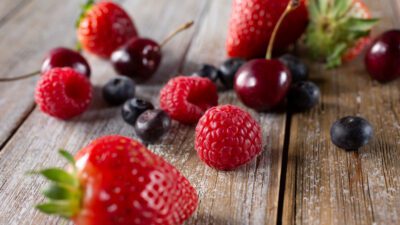
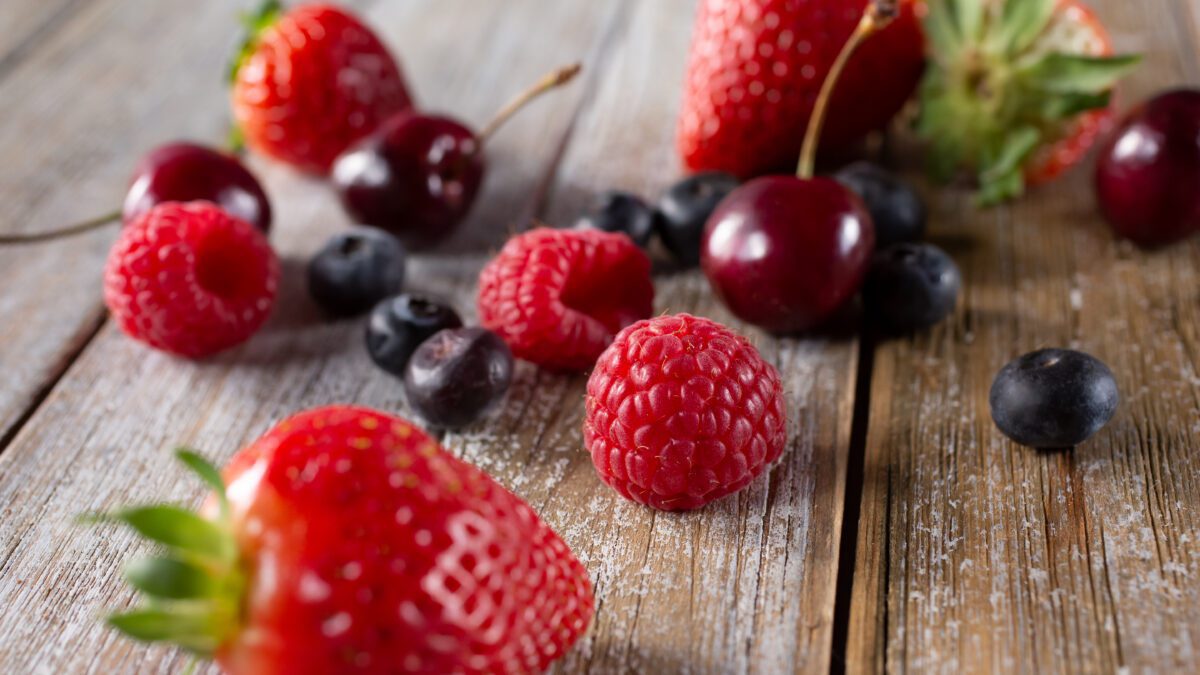


Berries are some of the healthiest foods around. They’re full of nutrients having a high content of fibre, vitamin C and antioxidants. They provide numerous health benefits for your body including reducing symptoms of chronic diseases. Berries can also often be found in jams, desserts and even some preservatives.
Blueberries are rich in vitamin K providing you with 36% of your recommended daily intake (RDI), 25% of manganese and 24% of vitamin C (1).
They also contain antioxidant polyphenols called anthocyanins (2). These antioxidants can reduce oxidative stress which in turn reduces the overall risk of heart disease in both individuals who are at a high risk of heart disease and healthy individuals (3, 4, 5). Additionally, blueberries have also been found to lower ‘LDL’ cholesterol levels which means the risk of heart attacks is reduced and artery function is enhanced (6, 7).
Studies also suggest that consumption of blueberries can improve and increase insulin sensitivity. These findings correlate with a reduced risk of type 2 diabetes by almost 26% (8).
These are often found in desserts and are an excellent source of fibre. In fact, one cup of raspberries can provide 8 grams of fibre, 54% of the RDI and 41% of manganese (9).
Raspberries also contain antioxidant polyphenols called ellagitannins, these can reduce oxidative stress (10). A 2005 study involving cyclists, found that consuming drinks of mixed berries including raspberries reduced oxidative stress which was caused by exercise (11).
Black raspberries have been found to be especially beneficial for heart health as studies suggest that they are able to reduce the risk factors for heart disease, blood pressure and blood cholesterol (12, 13, 14). Other research suggests that black raspberries are able to reduce inflammation in those who suffer from metabolic syndrome by reducing the size of polyps found in the colon – these are abnormal cell growths that can ultimately lead to cancer (15).
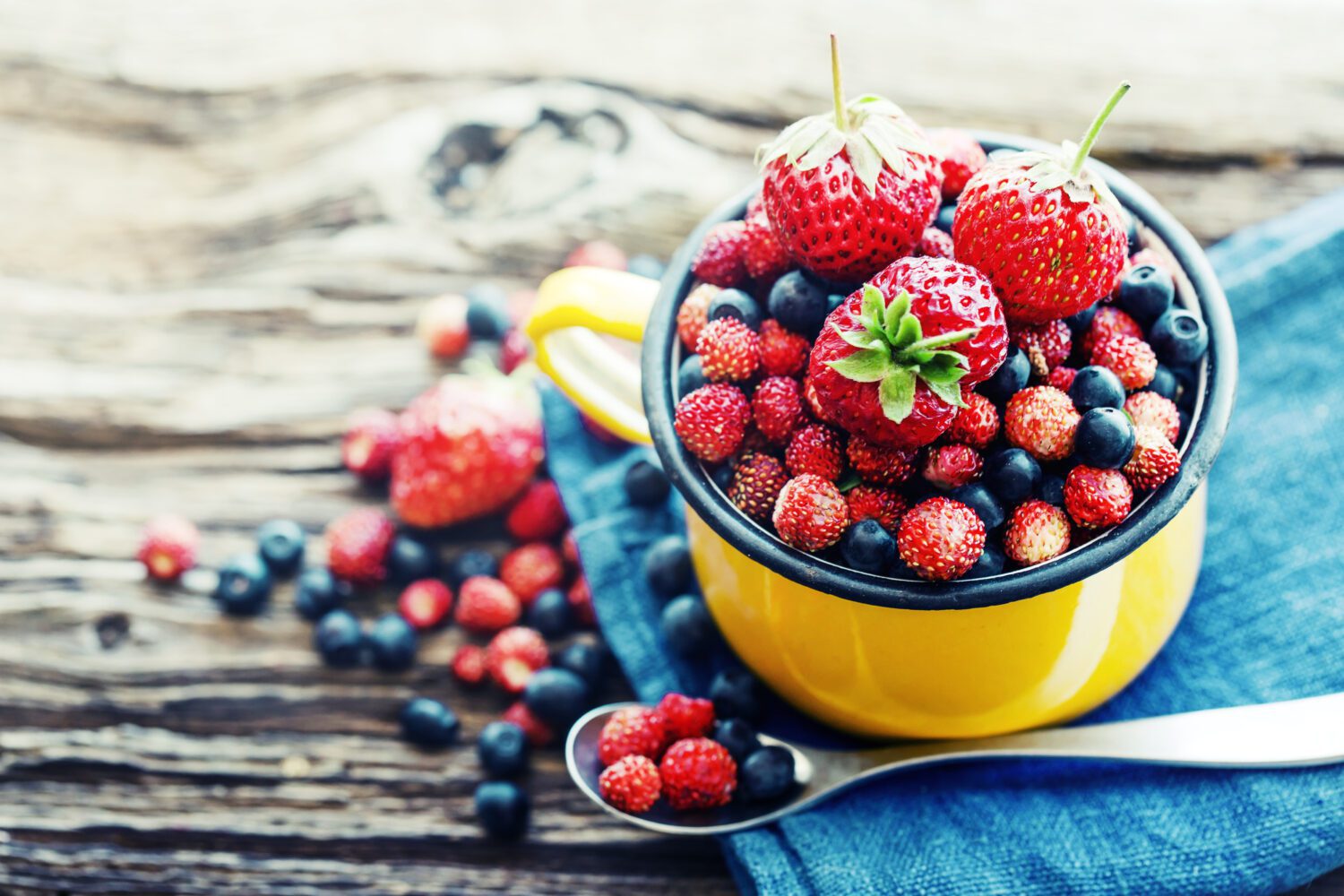
One of the most commonly consumed berries in the whole world and an excellent source of vitamin C. In fact, a single cup of strawberries contains 150% of vitamin C! (16)
Like many other berries, strawberries are good for your heart. Studies have found that those who regularly consumed both strawberries and blueberries on a weekly basis had a thirty per cent less risk of a heart attack (17). Strawberries have also been shown to reduce risk factors associated with heart disease, including blood triglycerides and oxidative stress (18, 19).
Most commonly consumed as a juice, cranberries are well known for their health benefit of reducing urinary tract infections (UTIs). There are certain chemicals that prevent E.coli bacteria from sticking to the bladder wall and urinary tract, which helps in the prevention of infections (20, 21). Multiple studies have found that drinking cranberry juice or taking cranberry supplements can significantly reduce the risk of developing a UTI (22, 23, 24).
Cranberry juice can even prevent the development of stomach ulcers and cancer by preventing H.pylori from attaching to the wall of the stomach, therefore preventing infections from occurring (25, 26).
These common berries are widely consumed whole as raw fruit and also as juices, wines and raisins. Both the skin and the seeds of grapes act as a rich source of antioxidants.
Grapes have also been associated with a twelve per cent reduction in the risk of type 2 diabetes development when consumed three times a week (27). Another study found that by eating drinking twelve ounces of grape juice daily for three months, both memory and driving performance appear to improve (28).
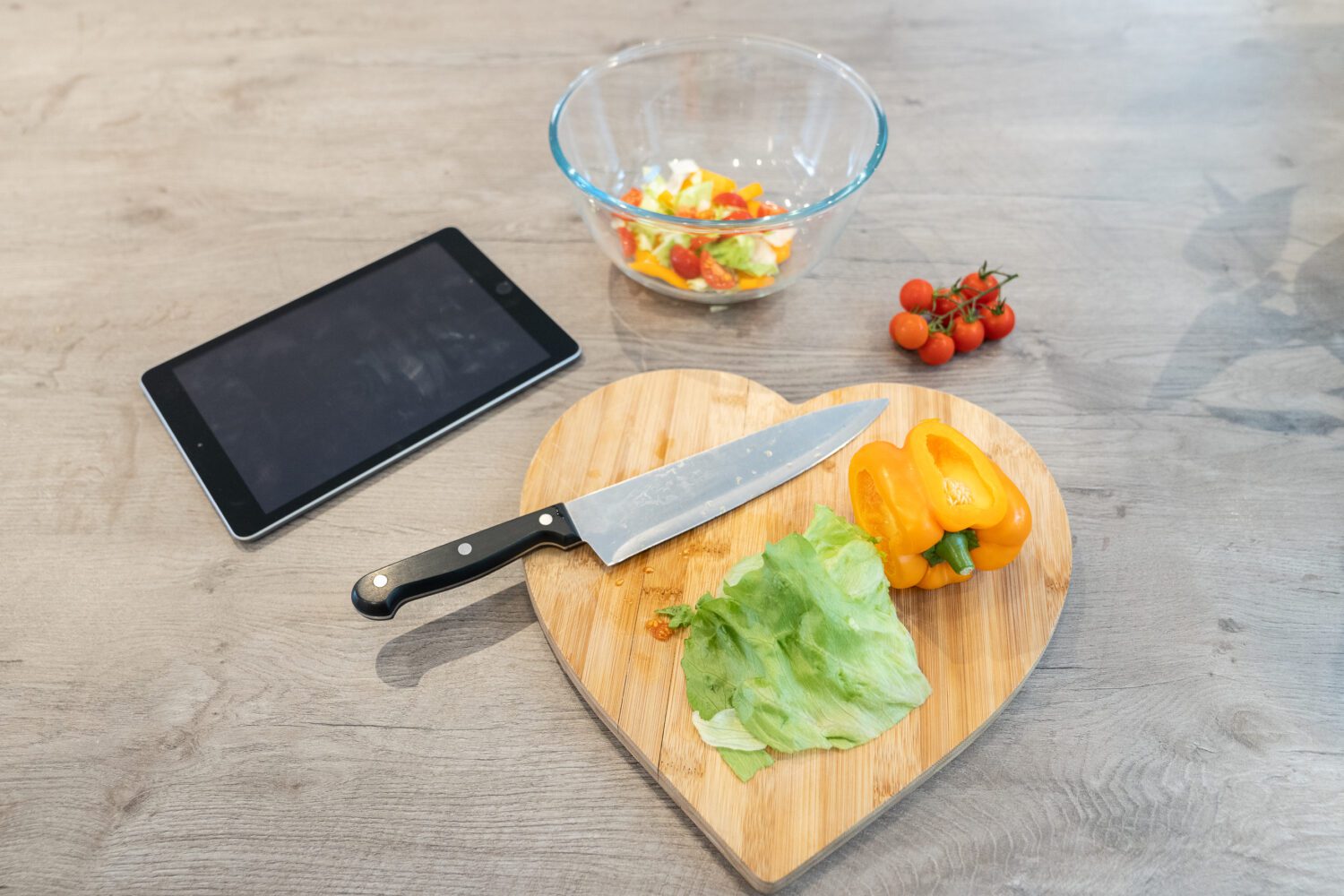
1. http://nutritiondata.self.com/facts/fruits-and-fru…
2. Prior, R.L. and Cao, G., 2000. Analysis of botanicals and dietary supplements for antioxidant capacity: a review. Journal of AOAC International, 83(4), pp.950-956.
3. Kay, C.D. and Holub, B.J., 2002. The effect of wild blueberry (Vaccinium angustifolium) consumption on postprandial serum antioxidant status in human subjects. British Journal of Nutrition, 88(4), pp.389-397.
4. Del Bo, C., Riso, P., Campolo, J., Møller, P., Loft, S., Klimis-Zacas, D., Brambilla, A., Rizzolo, A. and Porrini, M., 2013. A single portion of blueberry (Vaccinium corymbosum L) improves protection against DNA damage but not vascular function in healthy male volunteers. Nutrition research, 33(3), pp.220-227.
5. Riso, P., Klimis-Zacas, D., Del Bo, C., Martini, D., Campolo, J., Vendrame, S., Møller, P., Loft, S., De Maria, R. and Porrini, M., 2013. Effect of a wild blueberry (Vaccinium angustifolium) drink intervention on markers of oxidative stress, inflammation and endothelial function in humans with cardiovascular risk factors. European journal of nutrition, 52(3), pp.949-961.
6. Cassidy, A., Mukamal, K.J., Liu, L., Franz, M., Eliassen, A.H. and Rimm, E.B., 2013. High Anthocyanin Intake Is Associated With a Reduced Risk of Myocardial Infarction in Young and Middle-Aged WomenClinical Perspective. Circulation, 127(2), pp.188-196.
7. Basu, A., Du, M., Leyva, M.J., Sanchez, K., Betts, N.M., Wu, M., Aston, C.E. and Lyons, T.J., 2010. Blueberries Decrease Cardiovascular Risk Factors in Obese Men and Women with Metabolic Syndrome–3. The Journal of nutrition, 140(9), pp.1582-1587.
8. Muraki, I., Imamura, F., Manson, J.E., Hu, F.B., Willett, W.C., van Dam, R.M. and Sun, Q., 2013. Fruit consumption and risk of type 2 diabetes: results from three prospective longitudinal cohort studies. Bmj, 347, p.f5001.
9. http://nutritiondata.self.com/facts/fruits-and-fru…
10. Burton-Freeman, B.M., Sandhu, A.K. and Edirisinghe, I., 2016. Red raspberries and their bioactive polyphenols: cardiometabolic and neuronal health links. Advances in Nutrition, 7(1), pp.44-65.
11. Morillas-Ruiz, J., Zafrilla, P., Almar, M., Cuevas, M.J., Lopez, F.J., Abellan, P., Villegas, J.A. and Gonzalez-Gallego, J., 2005. The effects of an antioxidant-supplemented beverage on exercise-induced oxidative stress: results from a placebo-controlled double-blind study in cyclists. European journal of applied physiology, 95(5-6), pp.543-549.
12. Jeong, H.S., Kim, S., Hong, S.J., Choi, S.C., Choi, J.H., Kim, J.H., Park, C.Y., Cho, J.Y., Lee, T.B., Kwon, J.W. and Joo, H.J., 2016. Black raspberry extract increased circulating endothelial progenitor cells and improved arterial stiffness in patients with metabolic syndrome: a randomized controlled trial. Journal of medicinal food, 19(4), pp.346-352.
13. Jeong, H.S., Hong, S.J., Cho, J.Y., Lee, T.B., Kwon, J.W., Joo, H.J., Park, J.H., Yu, C.W. and Lim, D.S., 2016. Effects of Rubus occidentalis extract on blood pressure in patients with prehypertension: Randomized, double-blinded, placebo-controlled clinical trial. Nutrition, 32(4), pp.461-467.
14. Jeong, H.S., Hong, S.J., Lee, T.B., Kwon, J.W., Jeong, J.T., Joo, H.J., Park, J.H., Ahn, C.M., Yu, C.W. and Lim, D.S., 2014. Effects of black raspberry on lipid profiles and vascular endothelial function in patients with metabolic syndrome. Phytotherapy research, 28(10), pp.1492-1498.
15. Wang, L.S., Burke, C.A., Hasson, H., Kuo, C.T., Molmenti, C.L.S., Seguin, C., Liu, P., Huang, T.H.M., Frankel, W.L. and Stoner, G.D., 2014. A phase Ib study of the effects of black raspberries on rectal polyps in patients with familial adenomatous polyposis. Cancer Prevention Research, 7(7), pp.666-674.
16. http://nutritiondata.self.com/facts/fruits-and-fru…
17. Cassidy, A., Mukamal, K.J., Liu, L., Franz, M., Eliassen, A.H. and Rimm, E.B., 2013. High Anthocyanin Intake Is Associated With a Reduced Risk of Myocardial Infarction in Young and Middle-Aged WomenClinical Perspective. Circulation, 127(2), pp.188-196.
18. Basu, A., Fu, D.X., Wilkinson, M., Simmons, B., Wu, M., Betts, N.M., Du, M. and Lyons, T.J., 2010. Strawberries decrease atherosclerotic markers in subjects with metabolic syndrome. Nutrition research, 30(7), pp.462-469.
19. Zunino, S.J., Parelman, M.A., Freytag, T.L., Stephensen, C.B., Kelley, D.S., Mackey, B.E., Woodhouse, L.R. and Bonnel, E.L., 2012. Effects of dietary strawberry powder on blood lipids and inflammatory markers in obese human subjects. British Journal of Nutrition, 108(5), pp.900-909.
20. Howell, A.B., Botto, H., Combescure, C., Blanc-Potard, A.B., Gausa, L., Matsumoto, T., Tenke, P., Sotto, A. and Lavigne, J.P., 2010. Dosage effect on uropathogenic Escherichia coli anti-adhesion activity in urine following consumption of cranberry powder standardized for proanthocyanidin content: a multicentric randomized double blind study. BMC infectious diseases, 10(1), p.94.
21. Di Martino, P., Agniel, R., David, K., Templer, C., Gaillard, J.L., Denys, P. and Botto, H., 2006. Reduction of Escherichia coli adherence to uroepithelial bladder cells after consumption of cranberry juice: a double-blind randomized placebo-controlled cross-over trial. World journal of urology, 24(1), pp.21-27.
22. Kontiokari, T., Sundqvist, K., Nuutinen, M., Pokka, T., Koskela, M. and Uhari, M., 2001. Randomised trial of cranberry-lingonberry juice and Lactobacillus GG drink for the prevention of urinary tract infections in women. Bmj, 322(7302), p.1571.
23. Avorn, J., Monane, M., Gurwitz, J.H., Glynn, R.J., Choodnovskiy, I. and Lipsitz, L.A., 1994. Reduction of bacteriuria and pyuria after ingestion of cranberry juice. Journal of the American Medical Association, 271(10), pp.751-754.
24. Jepson, R.G. and Craig, J.C., 2008. Cranberries for preventing urinary tract infections. Cochrane Database Syst Rev, 1(1).
25. Zhang, L., Ma, J., Pan, K., Go, V.L.W., Chen, J. and You, W.C., 2005. Efficacy of Cranberry Juice on Helicobacter pylori Infection: a Double‐Blind, Randomized Placebo‐Controlled Trial. Helicobacter, 10(2), pp.139-145.
26. Gotteland, M., Andrews, M., Toledo, M., Muñoz, L., Caceres, P., Anziani, A., Wittig, E., Speisky, H. and Salazar, G., 2008. Modulation of Helicobacter pylori colonization with cranberry juice and Lactobacillus johnsonii La1 in children. Nutrition, 24(5), pp.421-426.
27. Muraki, I., Imamura, F., Manson, J.E., Hu, F.B., Willett, W.C., van Dam, R.M. and Sun, Q., 2013. Fruit consumption and risk of type 2 diabetes: results from three prospective longitudinal cohort studies. Bmj, 347, p.f5001.
28. Lamport, D.J., Lawton, C.L., Merat, N., Jamson, H., Myrissa, K., Hofman, D., Chadwick, H.K., Quadt, F., Wightman, J.D. and Dye, L., 2016. Concord grape juice, cognitive function, and driving performance: a 12-wk, placebo-controlled, randomized crossover trial in mothers of preteen children. The American journal of clinical nutrition, 103(3), pp.775-783.
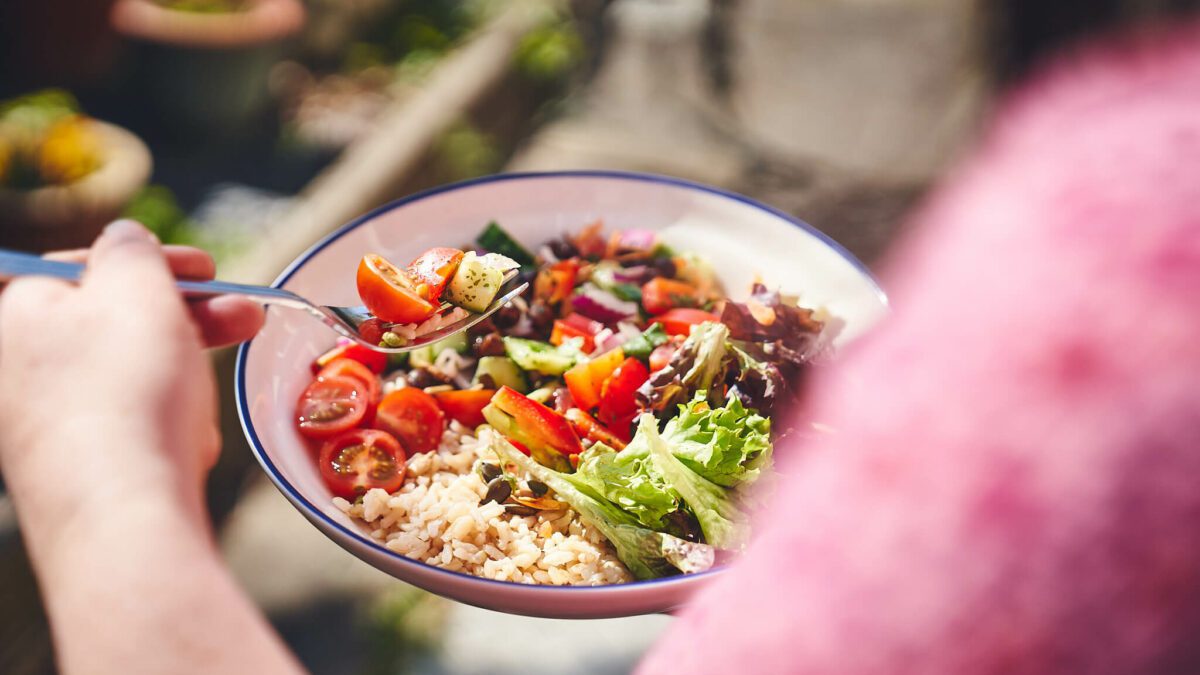
Discover our range of Nutrition Courses, and learn from industry experts.